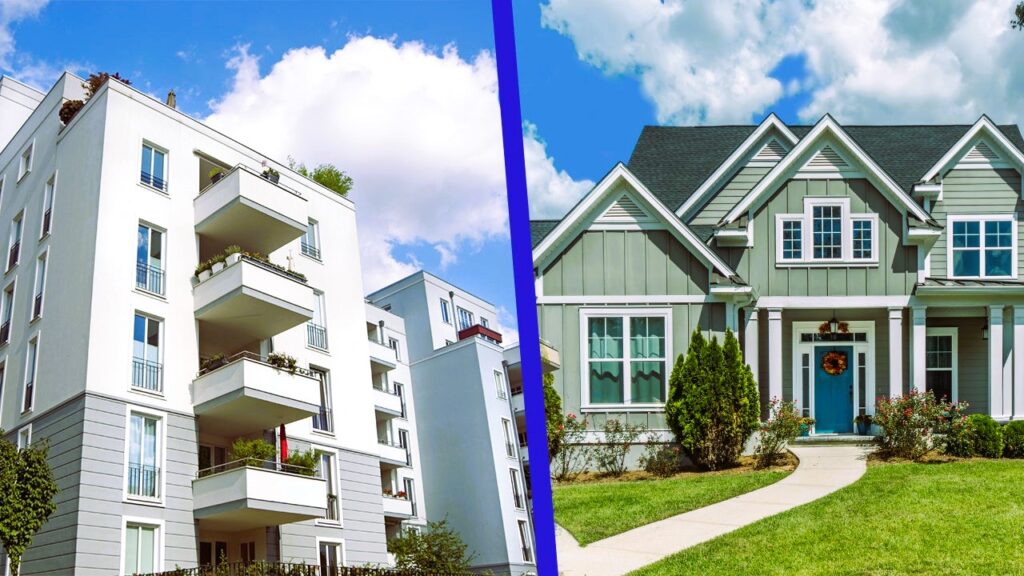Condominiums, or condos, have become increasingly popular in Canada’s real estate market, particularly in urban areas where space is limited and housing prices are high. Condo living offers a unique lifestyle and a range of benefits, but it also comes with its own set of considerations. In this article, we will explore the pros and cons of condo living in the Canadian context, helping you make an informed decision if you are considering purchasing a condo.
Pros of Condo Living:
- Affordability and Accessibility: Condos often provide a more affordable entry point into homeownership, especially in highly sought-after neighborhoods. They can be a viable option for first-time homebuyers or those looking to downsize. Additionally, condos are typically located in prime locations near amenities, transportation, and entertainment options, offering convenience and accessibility.
- Amenities and Services: One of the significant advantages of condo living is access to various amenities and services. Many condominium developments offer facilities such as fitness centers, swimming pools, rooftop terraces, concierge services, and shared common areas. These amenities provide added convenience and a luxurious lifestyle without the need for individual maintenance and upkeep.

- Maintenance and Repairs: In a condo, the responsibility for maintenance and repairs is often shared among the condo owners. This means that you won’t have to worry about tasks like snow removal, landscaping, or exterior maintenance. Condo living can be especially attractive for those who prefer a low-maintenance lifestyle or who travel frequently. Window ideas for Canadian courtyards, creating an oasis.
- Security: Condo buildings typically have security measures in place, such as controlled access systems, surveillance cameras, and on-site security personnel. This can provide residents with a sense of safety and peace of mind, particularly for those living alone or concerned about home security.
- Community and Social Interaction: Condo living often fosters a sense of community and social interaction. Shared amenities and common areas encourage residents to interact and get to know their neighbors. Condo associations or resident committees may also organize social events or activities, providing opportunities for community engagement and building friendships.
Cons of Condo Living:
- Monthly Fees and Assessments: Condo living comes with monthly fees, often referred to as condo fees or maintenance fees. These fees contribute to the maintenance and operation of the common areas and amenities. It’s essential to consider these ongoing costs when budgeting for a condo purchase. Additionally, special assessments may be levied if unexpected repairs or upgrades are required, which can result in additional financial burdens.
- Limited Privacy and Space: Condos are typically characterized by shared walls and close proximity to neighbors. This can result in a lack of privacy and potential noise disturbances. Additionally, the limited living space in condos compared to detached houses may not suit those who require ample room or prefer a more secluded living environment.
- Lack of Control over Decision-Making: Condo owners are subject to the rules and regulations set by the condo association or board. This means that certain decisions regarding maintenance, repairs, or changes to the property must be made collectively, limiting individual control. It’s important to review the condo bylaws and understand the governance structure before committing to condo living.

- Potential for Special Assessments and Fee Increases: While condo fees cover regular maintenance and upkeep, unexpected repairs or major renovations may require additional funds. In such cases, special assessments may be imposed on condo owners to cover the costs. Furthermore, condo fees can increase over time due to inflation or increased expenses, potentially impacting the affordability of living in a condo.
- Limited Appreciation Potential: Condos generally appreciate at a slower rate compared to single-family homes. This can be attributed to factors such as market demand, location, and the abundance of supply in some urban areas. If building maintenance or management issues arise, it may also negatively impact the value of individual units.
In conclusion, condo living in the Canadian market offers a range of benefits, including affordability, convenient amenities, and shared maintenance responsibilities. However, it’s crucial to consider the potential drawbacks, such as monthly fees, limited privacy, and reduced control over decision-making. Before purchasing a condo, carefully evaluate your lifestyle preferences, financial situation, and long-term goals to determine if condo living aligns with your needs and aspirations.

